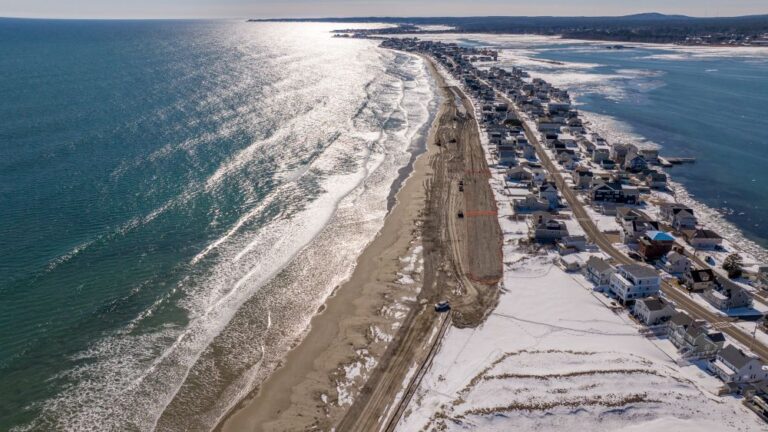Two forestry companies that were announced as recipients for hundreds of thousands of dollars in state grant money last December were issued environmental violations at their Maine facilities over the past several years.
One of the companies, ND Paper Inc., had a $101,400 state penalty finalized in late August for chemical spills at its Old Town mill in 2020 and 2022.
One spill led to a limited fish kill in the Penobscot River and continued issues with high-pH at the spill site near the riverbank, according to Maine Department of Environmental Protection officials.
A second company, T&D Wood Energy LLC, operates a wood pellet manufacturing facility in Sanford that was cited for nine violations of DEP regulations between 2019 and 2022, DEP records show.
Its violations stem from inadequate recordkeeping and exceeding the facility’s emissions limits. The company was most recently issued a violation notice in April 2023. If left unresolved, the violations could lead to monetary penalties.
David Madore, the DEP deputy commissioner, wrote in an email Monday that there is an enforcement action pending against T&D Wood Energy.
Last year, ND Paper was awarded $1 million through a state grant, called the Forestry Recovery Initiative, and T&D Wood Energy was awarded $600,000.
The initiative is administered by the Maine Technology Institute, a nonprofit created by the Maine legislature in 1999 to distribute state-funded grants and loans to spur economic growth and innovation.
T&D Wood Energy did not respond to a request for comment. An ND Paper spokesperson said the company works to monitor compliance at its facilities and reports to state regulatory agencies when issues arise.
When asked by The Maine Monitor if MTI had any concerns that some of the awarded companies, including ND Paper and T&D Wood Energy, had poor environmental compliance histories, the MTI president, Brian Whitney, wrote, “MTI does not necessarily agree with the assumption of the question that any of the companies have a poor compliance record.”
The Forestry Recovery Initiative grant uses funds from the federal pandemic rescue plan. The funds were allocated by Gov. Janet Mills to a state pandemic recovery plan, called the Maine Jobs & Recovery Plan, in 2021 with legislative approval.
The grant was to help Maine’s forestry companies recover financially from the COVID-19 pandemic, and support company projects that bolster long-term economic growth and job creation.
Phase One of the initiative in March 2022 awarded 224 small-scale forestry companies with $6 million in grants. The second phase awarded $14 million to a total of 19 larger forestry companies.
ND Paper and T&D Wood Energy were in the second phase. They plan to use the funds to expand productivity.
ND Paper intends to enhance the efficiency of a packaging paper machine at its Rumford mill, and T&D Wood Energy wants to acquire two shuttered facilities to expand operations, according to a webpage announcing the grant awards.
Since announcing the awards last December, Whitney wrote in an email that MTI has been finalizing the details.
Whitney said the application process for Phase Two included self-certification from the applicants that they were a business in good standing and confirmation from state agencies that the companies have not been banned from contracting with the state or federal government.
Overall consideration of grant applications, however, did not include separate investigations of the companies’ compliance with environmental laws, and an applicant’s history of environmental compliance was not used as a criterion to score applications, according to MTI.
“The application did not inquire about historical violations of environmental law,” Whitney wrote in an emailed response to the Monitor’s questions.
Whitney stated that such investigations into environmental compliance are not a requirement of the Maine Jobs & Recovery Plan.
Whitney wrote that before contracting with the awardees, MTI shared the list of grant recipients with the state’s Department of Economic and Community Development, and Department of Agriculture, Conservation and Forestry.
After the awards were announced, MTI “learned that T&D Wood was not in compliance with DEP,” Whitney wrote. “(T)hat contract and conditional award has not moved forward pending resolution of the outstanding issues with the state.”
ND Paper’s violations
Whitney said officials were unaware of ND Paper’s environmental violations until they saw a news report in July that ND Paper “faced a Maine DEP issue resulting from a spill at one of their other Maine locations” in Old Town.
Whitney said the MTI then received confirmation from DEP and the state DECD that ND Paper “had satisfactorily settled the issue.”
The $101,400 penalty for ND Paper was finalized by the Maine Board of Environmental Protection in August.
It was prompted by separate spill incidents at the company’s Old Town mill. In the first, 30,720 gallons of a sodium hydroxide mix was poured through a drain in September and October 2020 because of an open valve, leading to the increased pH levels and corresponding small-scale fish kill.
DEP staff members reported the floor drain system associated with the fall 2020 spill has been repaired, though Pam Parker with DEP’s Water Quality Bureau said in a meeting this month of the Maine Board of Environmental Protection that extensive repairs were difficult due to the facility’s age.
“… (T)his is an old industrial building with a tremendous amount of legacy piping, but also actively used systems,” Parker said. “So it was hard to be able to wholesale repair the facility …”
A smaller spill occurred at the same building in June 2022, when 1,076 gallons of a sodium hydroxide solution were released over a 30-day period.
ND Paper has repaired the parts of the Old Town facility that the spills originated from, according to the DEP, and installed monitoring equipment to prevent another incident.
As part of the consent agreement, ND Paper also has to investigate the high-pH material still detected underneath the spill site and create a remediation plan.
The Old Town mill has been closed since March.
Although ND Paper’s Old Town mill has been the most recent target of DEP enforcement, its Rumford mill, which its Forestry Recovery Initiative award is designated for, also has had recent environmental deficiencies, according to a U.S. Environmental Protection Agency database.
Between April 2020 and September 2022, the Rumford mill violated its National Pollutant Discharge Elimination System permit five times, the database shows. The permit is a federal license enforced by DEP that limits the wastewater a facility can legally discharge.
In an email, ND Paper spokesperson Jay Capron wrote that the company carefully monitors and maintains its systems to ensure environmental compliance with regulatory agencies.
“In addition, incidents are reported and elevated internally, and the process includes completing incident investigations, developing corrective actions, and presenting findings,” Capron wrote.
T&D Wood Energy’s track record
DEP has issued four warning letters to T&D Wood Energy’s Sanford facility since it came online in November 2018, as well as two violation notices, according to documents obtained by the Monitor through a Freedom of Access Act request.
In the first violation notice, issued in February 2020, DEP wrote that the agency received 13 air quality complaints between 2018 and 2020. Agency officials also made several visits to the plant.
The violation notice said because of the facility’s classification under the federal Clean Air Act and its guidance for state agencies to oversee facilities with the greatest potential for significant impact on human health and environment, DEP identified the violations as “High Priority,” and labeled T&D Wood as a “High Priority Violator.”
DEP acknowledged that as a new operation, T&D Wood and Player Design, Inc., which jointly hold an air emissions license for the facility, “have been working through startup of the new manufacturing process to come into compliance, resolve operational problems, and run an efficient, profitable business.”
However, DEP officials wrote, “The Department has given T&D Wood ample time to come into compliance.” That included delaying compliance testing and providing technical assistance from a department compliance inspector, according to the violation notice.
Four months later, in June 2020, T&D Wood received a DEP warning letter that stated, “Based on our findings there is more work to be done to come into full compliance,” citing excess smoke and dust, as well as incomplete reports.
In a follow-up inspection in August 2020, a DEP official wrote that an inspection at T&D Wood’s facility indicated compliance with the company’s air emissions license, but more test results were required.
A string of warning letters came two years later in July and December 2022, when the facility was again dinged for its emissions and incomplete recordkeeping. A full compliance evaluation in February 2022 identified several more violations.
The facility received its most recent violation notice in April, followed by the pending enforcement action.
T&D Wood Energy did not return emails or phone calls requesting comment.
Safeguards and concerns
According to Whitney with the Maine Technology Institute, there are several safeguards that keep grant awardees on track with the goals of the Forestry Recovery Initiative, including five years of quarterly reporting requirements beyond a project’s completion.
He added that if a grantee fails to comply with federal and state statutes, regulations or other grant requirements, MTI “would provide the grantee an opportunity to cure its issues, but MTI does retain the ability to terminate the agreement and seek reimbursement of the grant funds if necessary.”
Whitney said most of the funds have yet to be distributed.
In addition to ND Paper and T&D Wood’s outlined violations, five other companies awarded Forestry Recovery Initiative grants had instances of non-compliance with DEP regulations, according to the EPA database.
Sappi North America, Inc. was awarded $1 million for improvements in pulp and paper mill productivity at its facility in Skowhegan.
At that same facility, Sappi has five violations reported under its wastewater permit between April 2020 and September 2022, according to the EPA database.
Sappi received two violation notices from DEP and one warning letter for operations at its Skowhegan plant during that two-year span.
The EPA database shows two other violations from 2020 against Sappi on its water permit for its operations at a Westbrook mill. EPA also lists one more violation on Sappi’s air emissions license. Those notices came before the initiative awards were announced last December.
There were three warning letters issued under the air emissions license between January 2020 and July 2022, the EPA database shows.
Sappi North America did not respond to requests for comment on those violations and its plans for the grant award.
Hancock Lumber Company, Inc. was also awarded $1 million through the initiative for a project labeled “Bethel Value Added.”
At its Ryefield mill, Hancock Lumber has received several violation notices for a permit under the Safe Drinking Water Act, another federal license but for community water systems, though the company’s water system is listed as private and only serves 45 people.
Almost all of those violations are listed as “resolved” on the EPA database.
Erin Plummer, Hancock Lumber’s Chief Marketing Officer, said that the listed violations were due to a failure to submit annual lead and copper drinking water test results.
“After we realized we were in violation, we posted the results and are now fully compliant,” Plummer wrote in an email.
Plummer said the initiative funds would go towards a Hancock project to convert low value lumber into higher value, end-use products.
“Currently, nearly all of the low-grade eastern white pine fiber produced in Maine is shipped either out of state or out of country to be reprocessed into … higher value items,” Plummer said. “We are looking to bring this process in–house, which will create more jobs and keep the product in Maine.”
Robbins Lumber East Baldwin, LLC was awarded $1 million to purchase a sawmill edger that will replace a 40-year-old piece of equipment at its East Baldwin mill, according to Robbins spokesperson Catherine Robbins-Halsted.
Robbins-Halstead wrote in an email that the project will improve equipment efficiency and reduce energy consumption while making a demanding job easier for operators.
In response to a question about water violations reported at the company’s Searsmont facility, Robbins-Halsted said one group of violations was due to existing background groundwater concentrations.
Another violation stemmed from an effluent discharge that DEP had authorized, according to Robbins-Halsted.
“In both instances Robbins was communicating with DEP and working with DEP to comply with standards in a mutually agreed upon path. The alleged violations represent a gap between State DEP and Federal EPA data recordkeeping,” Robbins-Halstead wrote.
DAAQUAM Lumber Maine, Inc., was awarded $500,000 by the Forestry Recovery Initiative for a project to replace a kiln at its Aroostook County facility.
It has one violation for its air permit in August 2021 and two warning letters from DEP.
DAAQUAM did not return phone call and email inquiries on the violation, nor its plans for the Forestry Recovery Initiative awards.
ReEnergy Biomass Maine, LLC is the fifth company with listed environmental infractions before it was awarded initiative funding.
The company received $523,900 for projects at its Livermore Falls and Stratton facilities to harness a charcoal-like substance called biochar for potential use as a soil supplement, according to its spokesperson, Sarah Boggess.
In October 2022, the company had an NPDES permit violation at its Livermore Falls biomass-to-energy facility, which burns wooden material and converts it to electricity, when the facility exceeded its monthly average chromium limit by 18%.
According to Boggess, the company determined that the excess was due to washing activities while the facility was offline for the fall.
“To prevent a recurrence, the Livermore Falls team will isolate the wash water and dispose of it before it reaches the cooling tower so it is not included in the facility’s discharged water,” Boggess wrote in an email. “There was no financial penalty assessed.”
In response to those violations, Whitney said because the ECHO database relies on self-reported and time-limited violations, some may be relatively minor and do not result in enforcement actions if resolved with the regulator.
He said MTI is not in a position to pre-empt the responsible agency in enforcement proceedings or decisions.
Asked if any companies aside from ND Paper and T&D Wood energy that were awarded forestry initiative funds had outstanding environmental violations, DEP’s Madore directed a reporter to the EPA ECHO database.
Sean Mahoney, vice president of the Conservation Law Foundation’s Maine Advocacy Center, an environmental advocacy group, wrote in an email that if the state is going to provide public funds to help the private sector, there should be certain assurances.
“(T)hose companies should have their houses in order and be in compliance with all state and federal laws,” Mahoney wrote. “The situation with T&D Wood Energy appears particularly noteworthy given (its) lengthy history of noncompliance.”







